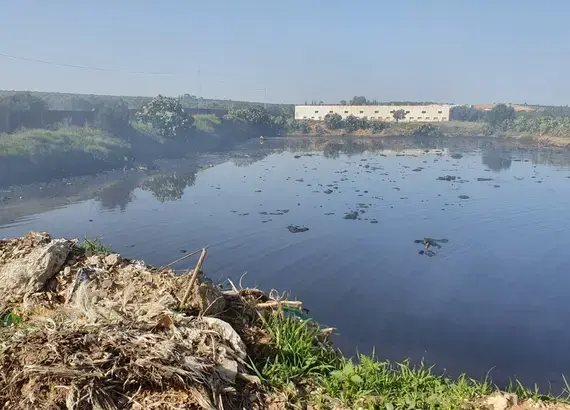
Success Story
Mitigating the Impacts of Olive Oil Waste in Tunisia
Olive oil is an integral part of Tunisia’s economy and livelihood, comprising half of the country's agricultural exports. Given that Tunisia is the second largest producer of the commodity globally, the industry generates a significant source of income, especially in rural areas. However, it simultaneously creates local waste management and environmental challenges. Olive oil production creates sizable amounts of toxic waste which can cause harmful environmental impacts if improperly handled, and many designated landfills are overflowing or do not follow proper preservation guidelines. The National Democratic Institute (NDI) recently helped address this problem in the coastal city of Monastir, as part of its broader work in Tunisia to collaborate with local political party branches on a series of projects to benefit local populations. These branches have positioned themselves to respond to some of their constituent’s most urgent requests, and while political instability and a lack of proper resources can complicate executing work at the local level, NDI’s experience demonstrates that there are opportunities for success.
Tunisia’s Sahel region, which includes Monastir, produces nearly one-third of the country’s olive oil for both domestic consumption and export. While production benefits the local community by fostering economic growth, the process also poses environmental hazards. Olive oil byproducts, such as olive mill wastewater, are not easily biodegradable and require a complex detoxification process before they can be safely disposed of. This process is expensive, which makes dumping the waste a more attractive alternative. Yet this decision is costly in environmental terms, as the toxins can accumulate in the soil and contaminate it. When the waste comes into contact with groundwater, drinking water sources can become polluted, posing a significant risk to those living near the waste facilities. Recognizing this issue, the local branch of Ennahdha, one of the country’s main political parties, proposed several suggestions on how to mitigate the risks to both humans and the environment.
The local branch conducted surveys and outreach activities to poll the local population about both their immediate and longer-term ideas for tackling these issues. One immediate suggestion was to institute the margin watering method for the farmers who own olive trees and enact penalties on those who toss the waste in unauthorized places. To popularize this, the Ennahdha branch will conduct awareness-raising and media campaigns for the farmers and the oil press owners. Ms. Mounira Gharbi, president of the department of plant production in the regional commissary for agricultural development in Monastir, stated that, “All of the suggested alternatives and solutions are quite important and they derive from a field study. From our standpoint, we support the proposal of using margin watering and we are prepared to train the farmers so they can start using this method.” This method converts olive mill wastewater into clean water or energy sources such as fertilizer or biofuel. When the waste is converted into other products, the need to dump it in landfills is eliminated. However, the local branch also proposed a suggestion that could be implemented while the farmers are being properly trained. The alternative solution was to shutter the landfill where the olive oil waste was being disposed of due to the landfill’s near overflow, and find an alternative site that follows the proper preservation guidelines. This would ensure that future quantities of olive oil waste would be safely discarded until the farmers were ready to implement the margin watering method.
The results of these surveys and activities regarding the proposed solutions showed that people were supportive of the initiatives, expressing their enthusiasm for a problem that had not been resolved by any other group. After speaking with experts, the local branch asked for NDI’s support with researching and drafting a strong policy paper to launch the project. The local Ennahdha branch recognized that this priority issue would receive widespread support from civil society because many civil society organizations (CSOs) already work on the subject, but most municipalities lack the financial and human resources to tackle it. Unexpectedly, the local branch even received support from party headquarters (HQs).
While national party headquarters do not typically involve themselves with local branch initiatives, the issue of olive oil waste management is one that exists in all governorates that produce olive oil, and when news of the project reached headquarters, politicians at the regional and national levels consequently expressed an interest in providing assistance. Ennahdha HQ offered its connections with members of parliament (MPs) to support its Monastir branch, even bringing in some national experts to provide information on the issue. Headquarters is also planning to facilitate a meeting with Kamel El-Doukh, the Tunisian Minister of the Environment and Local Affairs, to discuss the possibility of additional financial support, so that the branch can begin implementing the suggested solutions from the finalized policy paper.
Monastir’s waste management project also transcends regional and national levels. For example, the policy recommendations have the potential to be replicated across other political parties. Also, when the local branch conducted research on similar projects elsewhere, it discovered that olive oil waste management is an issue that spans beyond Tunisia, and the Ennahdha branch is now planning on reaching out to counterparts in Spain to exchange their experiences and best practices. The progress that this local branch has achieved, in cooperation with NDI, has the potential to cross international borders and positively impact communities both in Tunisia and abroad. In the coming months, NDI and the local branches will continue to work together to implement projects such as this, benefiting individuals and communities across the country.
NDI’s work with political parties is supported by the US Department of State Bureau of Near Eastern Affairs.
NDI is a non-profit, non-partisan, non-governmental organization that works in partnership around the world to strengthen and safeguard democratic institutions, processes, norms and values to secure a better quality of life for all. NDI envisions a world where democracy and freedom prevail, with dignity for all.



